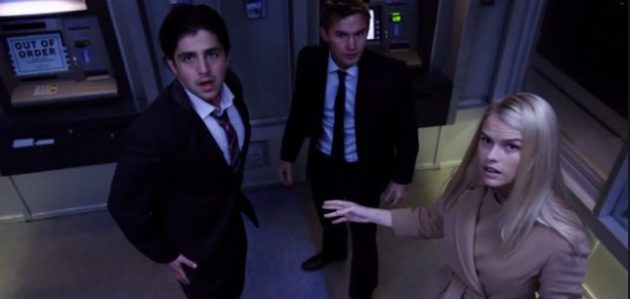REVIEW: ATM Starts with a Good Idea and Ends with an Overdraft

Characters in horror movies get to be forgiven a few featherbrained actions for the sake of suspense. Why go into the creepy basement after you've realized the lights aren't working? Why visit the decrepit mansion in the middle of nowhere after everyone's warned you off? Why stick around the haunted house long after a rational person would have fled to a motel at least two states away? (The upcoming Cabin in the Woods provides a clever, clever twist on this type of behavior.) Why? Because it's scary.
But even by the most lenient of genre standards, the behavior of the characters in David Brooks's ATM is ludicrous enough to make anyone grind his or her teeth in frustration. Its trio of unlucky coworkers winding up a night out are trapped and menaced by a dude in a coat. He's a big guy, but still — he's not even carrying a chainsaw or axe or other murder-y implement to start, and it's three against one. The film is built around one long standoff over the small hours of a frigid Midwestern night during which the man keeps his freezing and ever more desperate victims at bay inside a strip-mall ATM booth while we howl at the screen "Just walk out the door! The guy doesn't look very fast!" The number of contrivances needed to extend this situation for as long as it plays out pile up until you pray for a twist that reveals the whole thing to be some extensive practical joke, excusing the silliness of everything, after which they all go to Denny's for pancakes. Spoilers: There is no such twist.
David (Brian Geraghty), the film's protagonist, works at a finance firm where he spends his day apologizing helplessly to clients whose 401(k)s he hasn't been able to save and failing to ask out his crush Emily (Alice Eve). He's lured into sticking around for the office Christmas party by his obnoxious coworker Corey (The Wackness's Josh Peck), who informs him that Emily's leaving for a new job and that David's got one more evening to make his move. After a few false starts, David actually does, and he has arranged to give her a ride back to her place when Corey drunkenly insists on getting dropped off too. While cockblocking his way home, Corey bullies David into agreeing to stop for pizza, and then realizes he also needs to get cash. The three pull into a quiet parking lot with a pair of ATM machines inside a glass enclosure, and after they all end up taking refuge inside while Corey figures out his card isn't working, they turn to go and see an ominous figure standing in the parking lot watching them, face obscured by a fur-trimmed hood.
It's a promising opening, between Corey's charming/annoying advantage-taking, David's passivity and Emily's efforts to project receptiveness at her oblivious would-be suitor — these seem like actual characters, not just devices to enable the mechanics of a concept. And the claustrophobia of the main location, the way its florescent-lit everydayness becomes a barely adequate sanctuary from this mysterious threat (whoever the guy is, the three figure, he appears not to have a bank card that will get him through the security swiper) has cinematic appeal. But any tension the film has created dissipates quickly, around the time the trio watches their assailant casually smash another passerby's head onto the pavement, and decide they should withdraw as much money as they can to try to pay the guy off. He's just brutally murdered someone in front of them without provocation, and they offer him $500 and some earrings in exchange for walking away? At that point, has he not made it very clear he's either crazy or has already made the decision to kill everyone there?
ATM has an idea, but it's not one that can sustain a whole feature (this is director Brooks's first, from a screenplay by Chris Sparling, writer of the similarly minimal Buried). Its minimalism raises all the wrong kinds of questions — not about why this is happening to these three people, a topic they fruitlessly debate as they try to wait out the night, but why a security guard would pull up a few dozen yards away from a group of people screaming for help in the middle of a freezing night, get out of his car and blithely ask if they're OK. Or why no one brought a cell phone. Or why Emily seems to be there just to beg the two men not to go outside and not to leave her unprotected ("You can't leave me in here!"). Or why they would ever take their eyes off their attacker for a second.
In order to keep its situation going, the film has its characters act increasingly foolish, right down to the ridiculousness of its last reveal, the biggest, most nonsensical contrivance of them all. ATM shows an initial flicker of intelligence, which makes its spiral into absurdity all the more disappointing. Like late-night-drunk pizza, this is something you'd be better off skipping in favor of just eating some cereal at home.
Follow Alison Willmore on Twitter.
Follow Movieline on Twitter.

Comments
this is something you'd be better off skipping in favor of just eating some cereal at home.